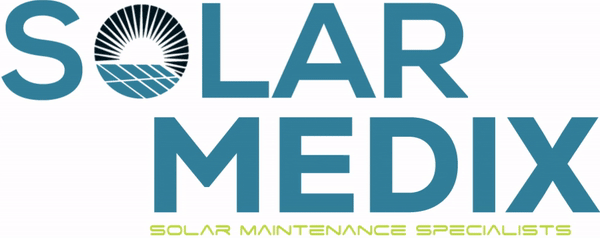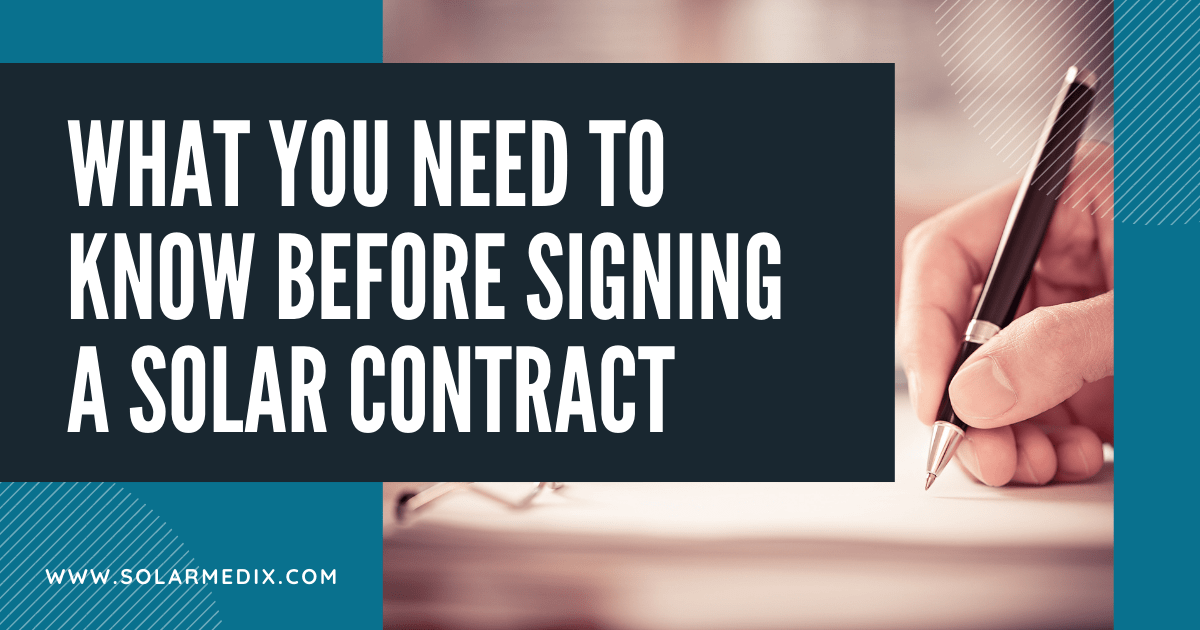When you decide to invest in a solar system, you are starting a partnership with a solar company that requires a good foundation. This foundation and the relationship you have with this company going forward rely heavily on the solar contract that you sign with them.
Unfortunately, many people end up in solar energy agreements that they don’t fully understand. When problems emerge down the road, they suddenly realize that the contract they initially signed does not favor them, and needless complications arise.
Solar contracts are unavoidable, especially when you settle for a solar financing option. So, the big question is, how do you ensure that you sign a contract that benefits and protects you and your investment as much as possible?
Let’s review what a typical solar contract contains and what we should factor in before signing on any dotted lines.
What is a Solar Contract?
A solar contract is a legally binding agreement between a solar company and its client(s). It is a crucial document as it details the terms and conditions of the solar company-client partnership. This contract is a comprehensive document that spells out everything that is expected from both parties.
Aren’t All Solar Contracts the Same?
The most straightforward answer to this question is, no, not all solar energy contracts are the same. While there are particular standards of operations expected by solar companies, how they choose to frame their terms and conditions can vary drastically.
For this reason, don’t ever jump the gun and sign a solar contract before taking your time to review it in its entirety. Keep in mind that what looks good on the surface does not necessarily reflect an agreement’s overall greatness, especially when it is legally binding.
It’s essential that you trust the solar company you choose to do business with, and the key here is transparency and setting the right expectations. Will they be responsible for maintenance or repair if something should go wrong with your system?
What warranties do you have in place for your solar equipment, and what kind of workmanship warranty does the contractor offer? Make sure that they take the time to explain the ins and outs of the installation process and answer any questions you might have.
Isn’t There an Industry Standard That All Solar Companies Should Abide By?
Yes, the solar industry is indeed regulated through strict policies and standards that all companies are expected to adhere to. However, these standards and policies only act as guidelines and do not directly touch on the details of contracts offered to clients.
While there could be violations of these policies in the agreement provided by a solar company, protecting yourself after the fact can be next to impossible. The only way to avoid this is by ensuring you get into the right contract, as this will be a long-term commitment with a solar company.
Factors to Take Into Account Before Signing a Solar Contract
1) Make sure that the contract is written in simple and clear terms
No solar company should ever present you with a contract written in confusing legalese. Instead, you need a simple and straightforward contract that you can quickly go through to understand its contents easily.
Never give in to high-pressure sales tactics that claim these contracts are just a formality. If the terms aren’t written in plain language that you can understand, it’s not in your best interest to move forward with this particular solar company.
2) Pay close attention to your financial mandates
One of the critical components of a solar contract is your financial mandate as the client. It’s never a good idea to resort to assumptions when it comes to money matters. You will need to discuss the project costs, expected payments, and how the company will maintain the installation plus maintenance.
You will also need to review any fine print to know if there are particular circumstances where you might have to pay more money to the solar company. If there is such a clause, then be sure to tread very carefully.
3) What are your rights?
Generally, solar energy contracts are written with the sole intent of limiting the liability of the solar company. As a client, this naturally places you at a disadvantage, which is why you need to know your rights once you sign the agreement.
The best way to determine that you will be protected if trouble arises is to judge the worst-case scenario and relate that to the terms and conditions set forth. For example, what will happen if you decide to sell your house and move to a new location? It’s important to answer these questions before signing a contract.
4) What is the responsibility of the installer/solar company?
It’s essential that you know what the solar company will be offering once you sign a contract. Verify that there is a clear path that defines what you can expect from them right from the very beginning.
Your solar contract also needs to be clear on how the solar company will confirm that you gain maximum value from your investment. This should not be a general statement that promises you will never pay electricity bills, but tangible ways the company will ensure the efficiency of the solar system’s performance.
5) How will the solar company get into an agreement with your electricity network?
Most solar companies promise to get into an agreement with your electricity company, so surplus energy is fed to the grid while you enjoy a stable electricity connection. However, you need to be clear on what happens if they do not get permission to connect to the utility grid.
6) Will the solar company stick to a single brand, or can they switch to another one?
Most solar companies will approach you with the guarantee to install only top-quality solar products, but they have the freedom to make changes stipulated in the contract. It is vital to check on the clause that specifies the brand the solar company will use and whether they can switch to another brand at any point in time.
Unfortunately, this can be a loophole used by solar companies to install low-quality products down the road because the initial brand products are not available.
7) Is there any salesperson promise that is not in writing?
Did the salesperson you’re dealing with promise you something in conversation that was not included in your solar contract?
If you bring this to their attention and they do not make it a point to amend your written terms accordingly, then you should not move forward with that contract. Anyone can promise you the world, but if their guarantees are not part of your written agreement, they’re not valid.
8) What is warranty coverage?
It’s essential to protect yourself and your investment, and the only way you can do so is by having warranty coverage. Most solar energy contracts are long-term, and you need an extended warranty to ensure that nothing goes wrong during this period.
The Bottom Line
A solar contract ultimately sets the stage for what you can expect from your solar company once you choose this green energy solution. Therefore, you need to be extra cautious when reviewing these documents before committing yourself to that “sweet deal.”
As a consumer, you must make yourself aware of everything detailed in your contract. If you have any doubts at all, trust your gut and don’t proceed to sign any binding agreement with that solar company.
If you’re feeling unsure about a solar contract and need a second opinion, let Solar Medix do the leg work and review your contract for you! We have partnered with law groups that have a niche for solar and can help you understand what you’re signing so that you don’t get taken advantage of by any solar installation companies. Contact us today to learn more!













